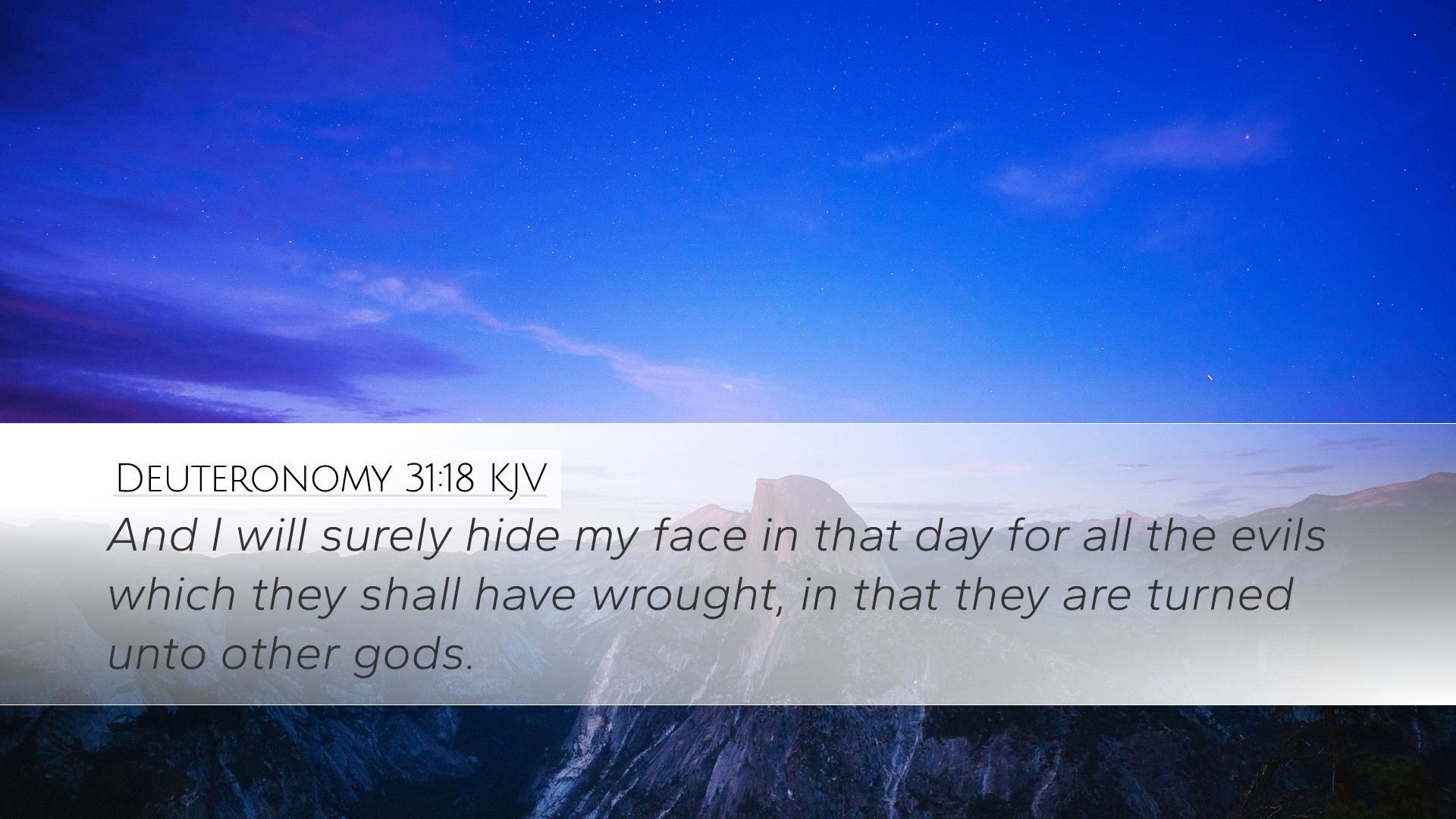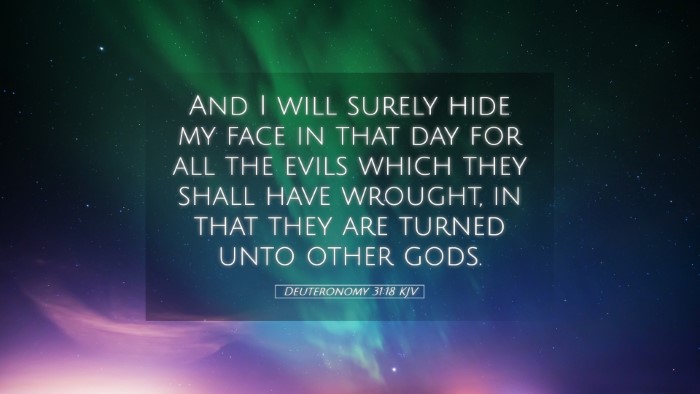Commentary on Deuteronomy 31:18
Deuteronomy 31:18 states:
"And I will surely hide My face in that day because of all the evil which they will do; for they will turn to other gods."
This passage serves as a pivotal warning to the Israelites as they prepare to enter the Promised Land. It addresses God's response to Israel's future disobedience and idolatry.
Contextual Overview
The book of Deuteronomy consists of Moses' speeches to the Israelites before they enter Canaan. In Chapter 31, Moses appoints Joshua as his successor and conveys crucial instructions about the law and the people's responsibilities. The tone shifts towards a somber reminder of what lies ahead if the people turn away from God.
Insights from Public Domain Commentaries
Matthew Henry's Commentary
Matthew Henry emphasizes the gravity of Israel's potential departure from God:
- Divine Withdrawal: Henry notes that the 'hiding of God's face' signifies His withdrawal of favor and protection. It indicates the consequences of sin, as God's presence is essential for blessing and prosperity.
- Foreknowledge of Sin: He points out that God, in His omniscience, is aware of the people's inclination toward idolatry. This foresight illustrates both God's justice and the necessity for the faithful to remain vigilant in adherence to His commandments.
- Calling for Repentance: The warning serves as a call to repentance and vigilance, reminding the reader of the constant need for spiritual fidelity. Henry encourages believers to reflect on their own hearts and the potential distractions of worldly idols.
Albert Barnes' Notes on the Bible
Albert Barnes offers an analytical perspective on the verse:
- God’s Hiddenness: Barnes expounds on the 'hidden face' of God, elucidating it as God's refusal to hear prayers and grant mercy. This aligns with the biblical theme where sin disrupts the relationship between God and His people.
- Idolatry's Consequences: He elaborates on how turning to 'other gods' is not just a mere act of worship but a severe breach of covenant loyalty. This reflects the covenantal relationship outlined throughout Deuteronomy.
- Assurance of Divine Justice: Barnes reaffirms the idea that while idolatry brings about God's hiddenness, it also assures His justice. God, being righteous, cannot overlook the rebellion of His chosen people.
Adam Clarke's Commentary
Adam Clarke provides further theological depth:
- Theological Implication: Clarke emphasizes that the phrase 'I will surely hide My face' illustrates a covenant stipulation where God's presence is contingent on Israel's faithfulness. This verse serves as a theological basis for understanding the relational dynamics between God and His people.
- Historical Context: He contextualizes the verse within the historical journey of Israel and the trials they faced. Clarke notes that God's warnings were meant to steer them back to fidelity and away from the patterns seen in previous generations.
- Encouragement of Faithfulness: Clarke concludes with an encouragement to maintain fidelity to God, asserting that the correct approach to divine worship is essential for sustained blessings.
Theological Reflections
From the insights gathered, several key theological reflections emerge regarding Deuteronomy 31:18:
- God's Justice and Mercy: The dual themes of justice (in the face of disobedience) and mercy (allowing for repentance) are evident. The compassionate nature of God allows for the possibility of return and restoration even after waywardness.
- Importance of Covenant Relationship: The covenantal relationship emphasizes that fellowship with God requires faithfulness. God’s 'hiding' signifies a breakdown in relationship necessitating sincere repentance and reconnection.
- Implications for Contemporary Believers: Modern readers can reflect on the idols in their own lives—whether they be materialism, secular ideologies, or relational distractions. The call to vigilance against these distractions remains pertinent today.
Conclusion
Deuteronomy 31:18 encapsulates a crucial message about the consequences of turning away from God. Through careful study and reflection on this verse, we discern a timeless call for vigilance, repentance, and fidelity in our relationship with the Divine. The insights from Matthew Henry, Albert Barnes, and Adam Clarke remind us of the importance of apprehending the seriousness of idolatry and the beauty of returning to God’s embrace.


